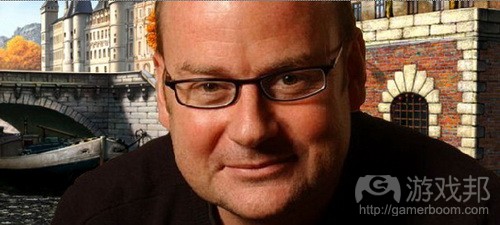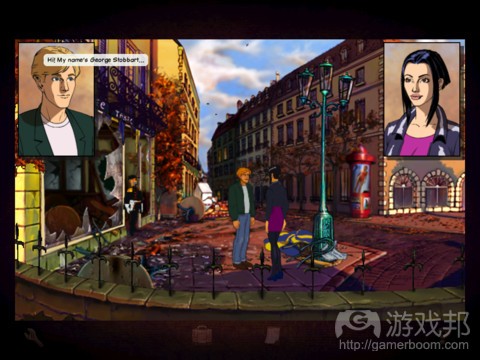Charles Cecil谈工作室如何推陈出新绝处逢生
作者:Keith Stuart
Charles Cecil是英国游戏行业的元老。他从小在非洲成长,后来才返回英国,进入汉普郡颇有名望的比代尔公立学校。他享誉全球的探险游戏内容有趣,样式新颖,这要归功于《丁丁历险记》及同题材早期杰作的影响;此外,他对圣殿骑士团也非常了解。
值得高兴的是,Charles依然继续制作《断剑》之类的传统探险游戏。5年前,他于1990年携手3位密友共同创建的开发工作室Revolution Software深陷困境。
他回忆称,“在推出《断剑3》后,我们就遇到资金危机。我们制作的所有游戏都亏本。计算方式非常简单,若游戏的售价是20英镑+零售增值税,商店将获得一半收益,发行商收取推广费用(游戏邦注:约3英镑),然后剩余的20%收入归开发者,约1.4英镑。现在,若你自行在App Store发行作品,你就需要投入资金,进行推广,但你将分得70%的收入。这完全改变游戏的商业运作模式。”
入驻苹果商店
Revolution在App Store之外表现突出。在iPhone发行初期,当时苹果积极推荐杀手级应用采用它的服务,苹果联系Cecil,询问他是否考虑将其中一款经典点击游戏转移到他们的平台。他们的看法是,触碰界面将取代传统鼠标和键盘输入装置。Revolution接受他们的提议。
最终他们就推出iPhone版《Beneath the Steel Sky》,这是诞生于1994年的科幻探险游戏,游戏采用漫画家大卫·吉布斯描绘的优美背景。Cecil表示,“游戏非常受欢迎,此时retina显示屏还没出现,所以尽管游戏资产的分辨率很低,但总体影响不大。”
倍受鼓舞之后,Revolution着手推出《断剑1&2》的Director’s Cut版本。他表示,“就很多方面来说,要重返《断剑》,查看其中薄弱环节非常简单,但颇令人高兴。坦白讲,我需要在Wikipedia查阅许多角色的介绍——有许多关于这段历史的文章。”
触控基础
值得庆幸的是,公司曾基于新界面和用户更新游戏作品——几年前,他们曾应育碧要求,制作Nintendo DS版《Broken Sword: The Directors Cut》。Cecil清楚这里的诀窍在于维持游戏原先的感觉,然后推进UI设计。“我觉得,由于DS及iPhone采用触控装置,我们需要更多涉猎第一人称题材——因为玩家实际上就是角色的手。这进展得非常顺利。iPhone版《断剑》获得91%的Metacritic评分。就游戏是采用15年前的资产内容这点来说,我对此感到非常自豪。”
Revolution没有加入App Store应用“价格战”。“你需要明确自己的想法,清楚自己是要采用免费模式,还是定价1美元,抑或是采用付费模式。我们坚持定价5美元,且1年内都不会改变:反复更改产品价格非常不可取,这会降低品牌的价值。”
“但1年过后我们会进行尝试。令我们的高兴的是,2011年初苹果邀请我们加入为期12天的圣诞促销活动,将《断剑》列作促销产品,在将游戏转变成免费模式当天,我们获得250万次的下载量。这带来非常惊人的效果,让我们掳获众多原本从未玩过这款游戏的用户。今年我们将把《断剑2》列作促销产品,所以去年我们总共获得500万次的下载量。我们只是个小型独立工作室,但我们甚至觉得自己足以同EA这样的巨头公司同场竞技——而在5年前,这完全是痴人说梦。”
变革之路
目前,Revolution主要3个人员组成:Charles、Noirin Carmody和编程元老Tony Warriner。他们目前正在制作一款新的探险游戏,这很可能是《断剑5》(游戏邦注:虽然Cecil今年底才会正式公布)。开发人员的工作时间非常灵活,包括10位内部员工及少数负责动画和音效的外包人员。工作室采用灵活、宽松的现代工作方式。
但新探险游戏有一个元素不会采用现代模式,那就是视觉风格。游戏将采用2D模式。Cecil表示,“在《断剑3》中,我们尝试将游戏转变成3D模式,重新改造探险内容。我们融入更多攀登元素——太多推箱子之类的内容。融入手柄,你需让玩家直接控制角色,这是个巨大转变;他们需要把握控制器的语法,这将许多探险游戏粉丝拒之门外。除此之外,整个领域现在由《神秘海域》和《蝙蝠侠》之类的高价位游戏主导。我的策略是巩固探险内容,在既有玩法中寻找创新点。这涉及发展变化。”
社交领域
我们稍微谈及探险游戏的未来。技术发展将如何改变这一题材?我们是否会看到融入意外叙述故事的游戏;围绕AI机制和程式情节的故事?Cecil对此不以为然:“玩家体验探险游戏是因为他们希望受到故事叙述者的指引——他们希望包含这样的设计。但我觉得在其他游戏题材中,意外叙述内容非常令人兴奋。”
令人惊讶的是,他还研究社交游戏现象。他郑重表示,“我很欣赏Zynga,但我是传统主义者——我觉得游戏的设计应该基于激情,而不是参数。我沉浸《Cityville》一段时间,但问题是,我太擅于分析。体验这款游戏几个星期后,我发现其机制就变得显而易见。Zynga用户很快就会转投其他更复杂的内容。在我看来,社交游戏的有趣之处在于,我们不会轻易就猜到下步即将出现的内容。”
事实证明,这是Revolution很有可能会涉猎的领域。Cecil表示,“我对在免费模式领域的故事陈述很感兴趣。基于免费模式的互动故事这一构思非常有趣,这是我目前正在探索的内容。这是能让玩家利用零碎时间的游戏内容,而且需要具有社交性(游戏邦注:所以你的好友需要参与其中,参与至故事之中)。这也许是个互动肥皂剧:你拥有稳固的社区,然后来自外部空间的元素会破坏社区的稳固性,这主要涉及玩家如何进行调节,角色如何影响故事。但所有内容都具有社交驱动性——这是必要条件。”
在Charles看来,探险游戏从某些方面来说也涉及挫折感。《断剑》玩家喜欢英雄George Stobbart所呈现的简单谜题;Charles及其团队喜欢把复杂的谜题打造成丰富的故事世界,不担心遇到后现代的打破陈规问题:也就是原生《断剑》中臭名昭著的山羊谜题,其引入新定时机制,只是想要避免出现单个区域——这令传统探险游戏玩家苦恼不已。但在现代游戏中,混淆玩家的理念已渐渐消失,而更多是希望迎合时间有限的玩家。这点在Facebook游戏领域的体现得淋漓尽致,这一平台的游戏完全摒除挑战元素。
Charles希望在自己的社交游戏中重新融入这一元素。他解释称,“在著作《Story》中,Robert McKee谈到期望差距。这里你的主角被置于压力之下,他们进行自己觉得要获得成功所要进行的操作。但有人或有事件阻碍他们,将他们置于危险境地,他们需要冒险进行其他尝试,然后他们又遇到另一阻碍。主角和目标之间的预期差距使得玩家产生情感反应。”
“这非常有趣,因为我们拥有同样的内容,只是我们将其称作玩法。你陷入困境,你需要想办法解决,包括情感或技巧层面。游戏奖励是故事获得发展。互动肥皂剧游戏的必要元素是包含满意玩法的平衡关系。Zynga在教授社交游戏设计规则方面表现突出,但未来还会其他开发者加入其中,呈现更复杂的体验。”
(本文为游戏邦/gamerboom.com编译,拒绝任何不保留版权的转载,如需转载请联系:游戏邦)
Charles Cecil: how App Store saved Revolution Software
by Keith Stuart
Charles Cecil and I are sitting in the members’ bar at Bafta, enjoying a cup of tea. Does video game journalism get any more debonair than that? I seriously doubt it.
But the rarefied setting is perfect, because Cecil is the avuncular gentleman of the British games industry. He spent his formative years in Africa, before returning to England and attending the prestigious Bedales public school in Hampshire. His globe-spanning adventure games are intelligent and stylish owing as much to Tintin as they do to the early greats of the genre; plus, he knows more about the Knights Templar than Dan Brown could forcibly shove into any of his bloated potboilers.
And it is great that Charles is still working on traditional adventure titles like Broken Sword. Because five years ago, Revolution Software, the development studio he founded in 1990 with three close friends, could have gone under forever.
“After Broken Sword 3, we were quite vulnerable financially,” he recalls. “As an independent developer, we were losing money on every title we produced. The maths is quite simple, if a game costs £20 plus VAT at retail, the store gets about half of that, and the publisher will take off their costs, which is about three pounds. Then they’ll pay the developer 20 percent of the rest, which is £1.40. Nowadays, if you self-publish on App Store, you may have to fund it and market it, but you’re getting 70 percent of the income. By any stretch of the imagination that totally transforms the commercial landscape.”
Enter Apple, stage left
Revolution has done well out of App Store. In the early days of the iPhone, when Apple was actively looking for killer apps to populate its service, the company contacted Cecil to see if he would consider bringing over one of Revolution’s classic point-and-click titles. The thinking was probably that the touchscreen interface would be the perfect modern equivalent of the old mouse and keyboard input. Revolution agreed.
The result was an iPhone version of Beneath the Steel Sky, the 1994 cyberpunk adventure featuring beautiful backdrops painted by comic book legend Dave Gibbons. “It was very well-received,” says Cecil. “This was before the retina display so the fact that the assets were fairly low-res didn’t matter.”
Emboldened, Revolution went on to release ‘Director’s Cut versions of Broken Swords 1 and 2. “In many ways, it was quite easy, but also very fulfilling, to go back to Broken Sword, to look at the weaknesses,” he says. “I admit, I had to look up a lot of the character biogs on Wikipedia – wonderful people have written huge amounts about the history, and I’d forgotten it all.”
Touching base
Helpfully, the company already had experience of updating the titles for new interfaces and users – it had produced a Nintendo DS version of Broken Sword: The Directors Cut for Ubisoft a few years before. Cecil knew the trick was in maintaining the classic feel of the games while evolving the UI. “I felt very passionately that, because of the tactility of the DS and later the iPhone screens, we should go into the first-person more – because you were effectively the hand of the character. It worked well. The iPhone version of Broken Sword has a Metacritic average of 91%. Considering the game is based on 15-year-old assets, I’m very proud of that.”
One thing Revolution hasn’t done is joined in the ‘race to the bottom’ of the App Store pricing scale. “You have to be quite clear about your proposition,” he says. “You have to be freemium, you have to be an instinct purchase at the $1 mark, or you have to be premium. We’re very much at the $5 premium end – and for a year we will not vary that: it’s not constructive to yo-yo your price around, it devalues the brand.
“But after a year we’ll experiment. We were delighted when Apple asked us at the beginning of 2011 to contribute Broken Sword to its 12 days of Christmas promotion – and on the day we made it free, we had 2.5m downloads. It was fantastic because it drew in a lot of people who never would have discovered Broken Sword otherwise. We put Broken Sword 2 in this Christmas, and so cumulatively last year we had five million downloads. And we’re a small independent developer! We really do feel like we’re on a level playing field with giants like EA – that would have been impossible five years ago.”
The revolutionary road
Today, Revolution is essentially three people: Charles, Noirin Carmody and veteran coder Tony Warriner. They’re currently working on a fresh adventure game, which is highly likely (highly, highly likely) to be Broken Sword 5 – though Cecil won’t confirm it until later this year. The development staff are employed on a freelance basis, with ten in-house and a smattering of outsourcers working on animation and audio (“all the elements that can be bundled and given to someone else, we do that,” says Cecil). It’s a very loose, adaptable and modern way of working.
One element of the new adventure that won’t be modernised, though, is its visual style. It will be 2D. “With Broken sword 3, we tried to re-invent the adventure by moving it into 3D,” says Cecil. “We had a lot more clambering around – too much box pushing, stuff like that. With a joypad, you have to give the player direct control over the character and it’s a substantial change; they have to understand the grammar of the controller, and that rules out a lot of adventure fans. And besides, that whole ground is now dominated by ultra expensive games like Uncharted and Batman. My approach is consolidating on the adventure, looking for innovations within the existing gameplay. It’s about evolution.”
Social saviours
We talk a little about the future of adventure games. How will technology transform the genre? Will we start seeing titles with emergent narratives; stories built from AI systems and procedural plots? Cecil is dismissive: “People play an adventure because they want to feel like they’re being led by a storyteller – they want to know it’s been crafted. But I think in other genres, emergent narratives are very exciting.”
Surprisingly, he is also studying the social gaming phenomenon. “I admire Zynga,” he cautiously admits. “But I’m a traditionalist – I think games should be designed on passion rather than metrics. I enjoyed Cityville for a while, but the problem is, I’m too analytical. I play for a few weeks, but then the mechanics become so obvious. The Zynga audience will soon be looking for something more sophisticated, and I think what’s interesting about social games is, it’s not immediately obvious where they’re going to go next…”
It turns out, this is an area that Revolution may well have a stake in. “I’m interested in how you can tell stories in the freemium space,” says Cecil. “The idea of an interactive story based on the free-to-play model is incredibly exciting and its something I’m exploring. It would be something you could play in small chunks, and it would have to be social – so your friends have really got to be involved, ideally in the story. Perhaps it would be an interactive soap opera: you have a stable community and then things come from outside to de-stabilise that, and it’s how players adjust, and how their characters affect the story. But the social driver is everything – that’s the way it needs to be.”
For Charles, too, adventure gaming is, in some ways about frustration. Broken Sword players love the obtuse puzzles that everyman hero George Stobbart is presented with; Charles and his team take great delight in carving complex riddles into the rich story worlds, not afraid to chuck in the odd post-modern, convention-junking problem: hence the infamous goat puzzle in the original Broken Sword, which introduced a new timing mechanic simply to beat one single area – much to the chagrin of traditional adventurers. But in current games, that desire to confound the player has largely disappeared, mostly in an effort to appease a more time-poor mainstream audience. Nowhere is this more obvious than in the world of Facebook gaming, in which the challenge has all but been removed.
Well, in his social game, Charles wants to put it back. “Look, in his book, Story, Robert McKee talks about the expectation gap,” he explains. “It’s where your protagonist is put under pressure and where they do what they feel they need to do to succeed. But then someone or something blocks them, puts them in jeopardy, and they have to take a risk, do something else – and then they encounter another block. And it’s this expectation gap, between the protagonist and their goal, that creates the emotion.”
“That’s very interesting because we have the same thing, but we call it gameplay. You’re being blocked and you have to work out – mentally or dextrously – what needs to be done. The reward is that the narrative advances. What is absolutely essential in an interactive soap opera is a balance that includes satisfying gameplay. Zynga has done a brilliant job of teaching the grammar of social gaming, but there are opportunities for other developers to come in at the next level, to offer a more sophisticated experience.”
And I realise as we finish our tea amid the bustle of the Bafta bar room, that this isn’t an abstract discussion about gameplay principles, it’s a project, it’s a game pitch. Cecil’s company Revolution has come from the edge of extinction to a position of equality with the biggest behemoths in the gaming world. I think perhaps this affable and charming man is getting ready to do battle with Zynga. I hope I am right. It is a battle that needs to be fought – and won – by affable, charming people.(Source:hookshotinc)









































 闽公网安备35020302001549号
闽公网安备35020302001549号